| Listing 1 - 10 of 22 | << page >> |
Sort by
|
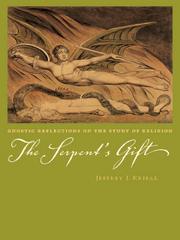
ISBN: 128195733X 0226453820 9786611957339 9780226453828 9781281957337 0226453804 9780226453804 0226453812 9780226453811 Year: 2007 Publisher: Chicago University of Chicago Press
Abstract | Keywords | Export | Availability | Bookmark
 Loading...
Loading...Choose an application
- Reference Manager
- EndNote
- RefWorks (Direct export to RefWorks)
"Because thou hast done this, thou art cursed above all cattle, and above every beast of the field." With those words in Genesis, God condemns the serpent for tempting Adam and Eve, and the serpent has shouldered the blame ever since. But how would the study of religion change if we looked at the Fall from the snake's point of view? Would he appear as a bringer of wisdom, more generous than the God who wishes to keep his creation ignorant? Inspired by the early Gnostics who took that startling view, Jeffrey J. Kripal uses the serpent as a starting point for a groundbreaking reconsideration of religious studies and its methods. In a series of related essays, he moves beyond both rational and faith-based approaches to religion, exploring the erotics of the gospels and the sexualities of Jesus, John, and Mary Magdalene. He considers Feuerbach's Gnosticism, the untapped mystical potential of comparative religion, and even the modern mythology of the X-Men. Ultimately, The Serpent's Gift is a provocative call for a complete reorientation of religious studies, aimed at a larger understanding of the world, the self, and the divine.
Religion --- Gnosticism. --- Cults --- Philosophy. --- gnostic, gnosticism, study, academic, scholarly, research, religion, religious studies, faith, belief, christian, christianity, genesis, bible, biblical, god, adam, eve, temptation, eden, garden, literature, literary, wisdom, creation, creationism, essay collection, rational, gospel, sexuality, jesus, john the baptist, mary magdalene.
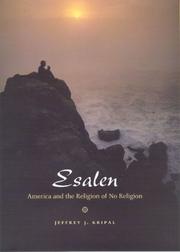
ISBN: 9780226453699 0226453693 Year: 2007 Publisher: Chicago (Ill.) : University of Chicago press,
Abstract | Keywords | Export | Availability | Bookmark
 Loading...
Loading...Choose an application
- Reference Manager
- EndNote
- RefWorks (Direct export to RefWorks)
Esalen has always been on the edge. Famous for its natural hot springs and stunning locale on the face of the Pacific coastline, the institute has long been a world leader in alternative and experiential education. Such luminaries as Henry Miller, Joseph Campbell, Aldous Huxley, Jack Kerouac, Allen Ginsberg, Hunter S. Thompson, and others have gathered there to develop their revolutionary ideas, transformative spiritual practices, and innovative art forms. Jeffrey Kripal here recounts the spectacular history of Esalen and its birth in the American counterculture. Forged in the literary and mythical leanings of the Beat Generation, inspired in the lecture halls of Stanford by radical scholars of comparative religion, the institute was the remarkable brainchild of Michael Murphy and Richard Price. Set against the heady backdrop of California during the revolutionary 1960s, 'Esalen' recounts in fascinating detail how these two maverick thinkers sought to fuse the spiritual revelations of the East with the scientific revolutions of the West, or to combine the very best elements of Zen Buddhism, Western alchemy, and Indian yoga& particularly in its Tantric forms& into a decidedly utopian vision that rejected the dogmas of conventional religion. In their religion of no religion, the natural world was just as crucial as the spiritual one, science and faith not only commingled but became staunch allies, and the enlightenment of the body& through self-enhancement and, yes, free love& could lead to the full realization of our development as human beings. Darwin, Tantric sex, cold war physics, psychedelic drugs, golf, and, of course, religion all come into play in a book that can only be described as monumental. 'Esalen' is a prehistory of our nation's current fascination with Eastern religions, our steadily growing acceptance of the supernatural in everyday life& and a surprising page-turner.
Religion and culture --- Esalen Institute. --- United States --- Religion.
Book
ISBN: 022612682X 022649148X Publisher: University of Chicago Press
Abstract | Keywords | Export | Availability | Bookmark
 Loading...
Loading...Choose an application
- Reference Manager
- EndNote
- RefWorks (Direct export to RefWorks)
Book
ISBN: 9780028663517 Year: 2017 Publisher: Farmington Hills, Mich. Macmillan Reference USA
Abstract | Keywords | Export | Availability | Bookmark
 Loading...
Loading...Choose an application
- Reference Manager
- EndNote
- RefWorks (Direct export to RefWorks)
Book
ISBN: 9780226820248 9780226820255 Year: 2022 Publisher: Chicago, Ill. The University of Chicago Press
Abstract | Keywords | Export | Availability | Bookmark
 Loading...
Loading...Choose an application
- Reference Manager
- EndNote
- RefWorks (Direct export to RefWorks)
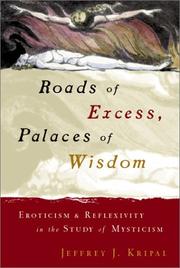
ISBN: 0226453790 Year: 2001 Publisher: Chicago (Ill.) : University of Chicago press,
Abstract | Keywords | Export | Availability | Bookmark
 Loading...
Loading...Choose an application
- Reference Manager
- EndNote
- RefWorks (Direct export to RefWorks)
Homosexuality --- Mysticism --- Sex --- Religious aspects --- Study and teaching --- History --- Religious aspects.
Book
ISBN: 0226453715 Year: 2007 Publisher: Chicago ; London : The University of Chicago Press,
Abstract | Keywords | Export | Availability | Bookmark
 Loading...
Loading...Choose an application
- Reference Manager
- EndNote
- RefWorks (Direct export to RefWorks)
Jeffrey Kripal here recounts the spectacular history of Esalen, the institute that has long been a world leader in alternative and experiential education and stands today at the center of the human potential movement. Forged in the literary and mythical leanings of the Beat Generation, inspired in the lecture halls of Stanford by radical scholars of comparative religion, the institute was the remarkable brainchild of Michael Murphy and Richard Price. Set against the heady backdrop of California during the revolutionary 1960s, Esalen recounts in fascinating detail how these two maverick thinkers sought to fuse the spiritual revelations of the East with the scientific revolutions of the West, or to combine the very best elements of Zen Buddhism, Western psychology, and Indian yoga into a decidedly utopian vision that rejected the dogmas of conventional religion. In their religion of no religion, the natural world was just as crucial as the spiritual one, science and faith not only commingled but became staunch allies, and the enlightenment of the body could lead to the full realization of our development as human beings. “An impressive new book. . . . [Kripal] has written the definitive intellectual history of the ideas behind the institute.”—San Francisco Chronicle “Kripal examines Esalen’s extraordinary history and evocatively describes the breech birth of Murphy and Price’s brainchild. His real achievement, though, is effortlessly synthesizing a dizzying array of dissonant phenomena (Cold War espionage, ecstatic religiosity), incongruous pairings (Darwinism, Tantric sex), and otherwise schizy ephemera (psychedelic drugs, spaceflight) into a cogent, satisfyingly complete narrative.”—Atlantic Monthly “Kripal has produced the first all-encompassing history of Esalen: its intellectual, social, personal, literary and spiritual passages. Kripal brings us up-to-date and takes us deep beneath historical surfaces in this definitive, elegantly written book.”—Playboy
Religion and culture --- Esalen Institute. --- United States --- Religion. --- esalen, experiential education, human potential movement, beat generation, stanford, comparative religion, spirituality, yoga, psychology, buddhism, zen, richard price, michael murphy, california, 1960s, counterculture, eastern philosophy, science, faith, enlightenment, cold war, activism, espionage, darwinism, tantric sex, sexuality, psychedelic drugs, spaceflight, space, nasa, nonfiction.
Book
ISBN: 1283362635 9786613362636 0226453898 9781283362634 9780226453897 Year: 2010 Publisher: Chicago : University of Chicago Press,
Abstract | Keywords | Export | Availability | Bookmark
 Loading...
Loading...Choose an application
- Reference Manager
- EndNote
- RefWorks (Direct export to RefWorks)
Most scholars dismiss research into the paranormal as pseudoscience, a frivolous pursuit for the paranoid or gullible. Even historians of religion, whose work naturally attends to events beyond the realm of empirical science, have shown scant interest in the subject. But the history of psychical phenomena, Jeffrey J. Kripal contends, is an untapped source of insight into the sacred and by tracing that history through the last two centuries of Western thought we can see its potential centrality to the critical study of religion.Kripal grounds his study in the work of four major figur
Parapsychology --- History. --- Religious aspects. --- Myers, F. W. H. --- Fort, Charles, --- Society for Psychical Research (Great Britain)
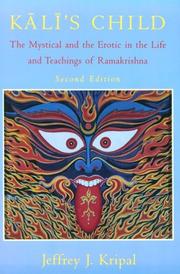
ISBN: 0226453774 Year: 1998 Publisher: Chicago (Ill.): University of Chicago press
Abstract | Keywords | Export | Availability | Bookmark
 Loading...
Loading...Choose an application
- Reference Manager
- EndNote
- RefWorks (Direct export to RefWorks)
Hindus --- Ramakrishna, --- Ramakrishna Mission
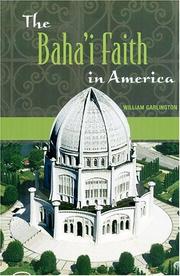
ISBN: 9780275984137 Year: 2005 Publisher: Westport, Conn. Praeger Publishers
Abstract | Keywords | Export | Availability | Bookmark
 Loading...
Loading...Choose an application
- Reference Manager
- EndNote
- RefWorks (Direct export to RefWorks)
| Listing 1 - 10 of 22 | << page >> |
Sort by
|

 Search
Search Feedback
Feedback About UniCat
About UniCat  Help
Help News
News